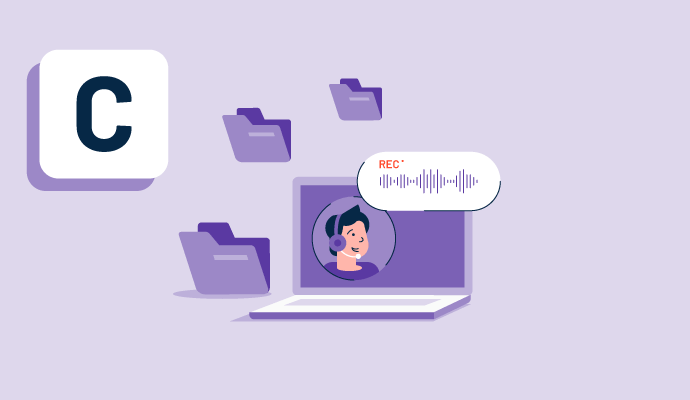¿Qué es la grabación de llamadas?
La grabación de llamadas es el proceso de capturar o grabar conversaciones telefónicas. Después de grabar una llamada, el sistema almacena automáticamente el archivo de audio digital para que más tarde pueda ser reproducido y analizado. Las empresas pueden usar la grabación de llamadas por varias razones, como capacitación, optimización de procesos y aseguramiento de la calidad. La grabación de conversaciones telefónicas se puede realizar ya sea por voz sobre IP (VoIP) o a través de una red telefónica pública conmutada (PTSN).
La grabación de llamadas generalmente se ofrece como una característica con software de operaciones de centros de contacto. Esta característica permite grabar llamadas entrantes y salientes en el centro de llamadas. Sin embargo, depende del centro de contacto si quiere que todas las llamadas sean grabadas o solo algunas como muestra.
Beneficios de la grabación de llamadas
La grabación de llamadas se realiza según las necesidades del negocio. Algunos beneficios de la grabación de llamadas incluyen:
- Mejorar el servicio al cliente: Con la monitorización y evaluación constante de las llamadas entrantes y salientes, se vuelve más fácil para los supervisores o gerentes controlar la calidad del servicio.
- Aseguramiento de la calidad: Existen varias soluciones de software que proporcionan aseguramiento de la calidad del centro de contacto. Sin embargo, las grabaciones de llamadas proporcionan acceso en tiempo real a gerentes y supervisores para monitorear la calidad de las llamadas. Por lo tanto, es un componente crítico del aseguramiento y gestión de la calidad.
- Requisito de cumplimiento: Las grabaciones de llamadas ayudan a verificar si un agente ha seguido todos los criterios y protocolos de cumplimiento requeridos durante una llamada con los clientes.
- Monitoreo y evaluación del rendimiento del agente del centro de llamadas: La grabación de llamadas ayuda a determinar el rendimiento de un agente mientras habla con los clientes por teléfono. La forma en que un agente trata al cliente y ayuda a resolver problemas solo se puede evaluar con la grabación constante de llamadas.
- Obtener información centrada en el cliente: Información como expectativas, preferencias, quejas y aspiraciones del cliente es algo que se puede obtener mediante la grabación de llamadas. Esta información se puede utilizar para ofrecer una experiencia de servicio más personalizada.
- Incorporación y capacitación: Las grabaciones de llamadas pueden entrenar a un agente para desempeñarse mejor en el futuro, pero referirse a grabaciones de llamadas antiguas también puede ayudar a los nuevos empleados a entender las expectativas y darles conocimiento práctico de cómo manejar a los clientes en todas las situaciones.
- Resolución de disputas: En cualquier situación desafortunada en la que una empresa necesite mantener su reputación de marca, las grabaciones de llamadas ayudan a resolver disputas con los clientes.
Mejores prácticas de grabación de llamadas
- Informar a los clientes antes de grabar: Los centros de contacto a menudo usan un mensaje automatizado para informar a sus clientes cuando se está grabando una llamada. Por ejemplo, el mensaje "esta llamada está siendo grabada para fines de calidad y capacitación" se usa comúnmente. Esta declaración ayuda a construir confianza entre los clientes y el centro de llamadas.
- Seguir la ley de grabación de llamadas de servicio al cliente: Para grabar llamadas, cada empresa necesita estar al tanto y seguir cualquier ley y regulación gubernamental local sobre la grabación de llamadas. También pueden necesitar solicitar permiso al respecto.
- Establecer un equipo para monitorear las grabaciones de llamadas: El propósito de la grabación de llamadas se anula si no hay nadie para revisarlas. La grabación de llamadas es solo una parte de todo el proceso; para obtener el máximo beneficio de las características de grabación de llamadas, una empresa debe establecer un equipo de monitoreo.
Grabación de llamadas vs. grabación de pantalla
Muchas soluciones de software proporcionan la grabación de pantalla como una característica adicional junto con la grabación de llamadas. Mientras que la grabación de llamadas se refiere a grabar llamadas entrantes y salientes, la grabación de pantalla se refiere a grabar toda la pantalla de trabajo del agente durante una llamada.
La grabación de pantalla ayuda a obtener información sobre el flujo de trabajo del agente, incluyendo cómo el agente navega por las aplicaciones de escritorio durante una llamada. La grabación de pantalla proporciona una representación visual del escritorio de un agente, mientras que la grabación de llamadas es una referencia de audio de la llamada del agente con un cliente.

Priya Dey
Priya is a senior research analyst at G2 focused on customer service software. Prior to joining G2, Priya worked as a secondary market research analyst in one of the Big 4's for more than 5 years. In her free time, she enjoys cooking and spending time with her friends and family.

















